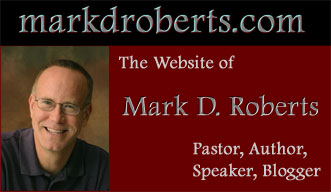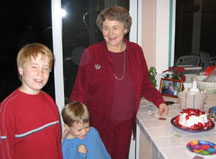| |
A Resource by Mark D. Roberts |
|
Archive for May 2005
Note: This archive contains all of my posts for this month that are not included in some other series. I really don't have the time to save things in more than one place. If you're looking for a specific item, use the "Search" button in the upper left hand corner. Thanks. |
by Rev. Dr. Mark D. Roberts
Copyright © 2005 by Mark D. Roberts
Note: You may download this resource at no cost, for personal use or for use in a Christian ministry, as long as you are not publishing it for sale. All I ask is that you give credit where credit is due. For all other uses, please contact me at mark@markdroberts.com. Thank you.
How Not to Make Conflict Worse: Wisdom from My Mother 
Posted for Mother's Day, Sunday, May 8, 2005
First of all, I want to wish a Happy Mother's Day to all of my readers who are also moms.
Today's post isn't a part of my current series, strictly speaking, though it is closely related. In this post I want to honor my mother by remembering some of the best advice she ever gave me. If you follow her advice, I guarantee, not only that you'll have less conflict in your life, but also that you'll be well on your way to bringing peace both in the church and in the world.
What's this gem of advice? It's simple: Two wrongs don't make a right. I don't know the origins of this saying. I've searched around a bit and haven't found much help. (Any ideas?) But, in point of fact, in my own life the origin is clear. "Two wrongs don't make a right" came out of the mouth of my own mother, probably a thousand times.
I grew up in a family with four children. Inevitably we would bug each other, borrow each other's stuff without asking, or even hit one another in anger. What would my mom say as one of us was running off to seek revenge? "Two wrongs don't make a right."
I don't know if, when I was young, my mom's logic ever persuaded me not to multiply wrongs. But I did know that if I clobbered my brother after he hit me, there would be consequences I didn't want to face. "Two wrongs don't make a right" in the Roberts's Boyhood Translation meant: "You do it, and you're in big trouble." |
|
| |
My mom and a couple of her silly grandchildren getting ready to celebrate her birthday. |
As an adult I've come to appreciate the wisdom of my mom's simple proverb. From personal experience, I know that if somebody hurts me and I strike back in anger, things will only get worse. I must confess that I've probably done this a hundred times in the last ten years. One of my favorites happened in a meeting of the board of elders of my church. An elder made a suggestion that I found personally offensive (though he didn't mean it that way). Without even thinking I shot back, "Over my dead body will that happen!" Now, of course, it was his turn to be offended. But this man, obviously having internalized my mother's advice better than I had, responded by apologizing for having offended me. I quickly backed down, feeling rather like a fool.
As I watch Christians going through conflict, both in my church and in others, I'm amazed at how often godly, mature people respond to wrongdoing in another by doing wrong themselves. Sometimes this happens in a flash of anger, which is understandable though unacceptable. But sometimes people choose quite intentionally to do wrong to those who have wronged them. It always amazes me, but it's true.
For example, a couple of years ago leaders in one of my ministries were struggling with disagreement over a strategic plan. One man I'll call "Jim" said something that seemed to impugn the integrity of another man I'll call "Andy." Andy, incensed and embarrassed, sent Jim a scorching e-mail, copying me and several others in the process. Andy's note was so obviously inconsistent with Christian kindness that I was shocked, not only that he would act this way, but also that he would actually send a copy of his literary sin to me and several others. But Andy didn't see his behavior this way. He viewed his harshness as necessary and consistent with the way Jim had treated him. It was consistent with Jim's initial offense, but that was exactly the problem. Rather than speaking the truth in love, Andy had chosen to fight fire with fire, or more literally, to fight sin with sin. Not a good idea. Just ask my mother. (Of course if you don't believe her, you could ask Jesus, who told us to do things like turn the other cheek and walk the second mile.)
All of this is easy to say when you're sitting on the sidelines. But when you're in the heat of conflict, it's terribly easy to give in to the fallen desire for revenge. Rather than taking the high road, we get down in the gutter with the one who has wronged us. Then when everything is worse, when we're all muddy and dirty, we wonder what went wrong. Again, I speak from personal experience.
So if when you find yourself in conflict with another person, and especially if that person takes a shot at you, I'd urge you to remember my mother's wisdom: "Two wrongs don't make a right." Even though you've been wronged, choose to do what is right in the eyes of the Lord. You'll be glad you did, and so will He.
Home
|






